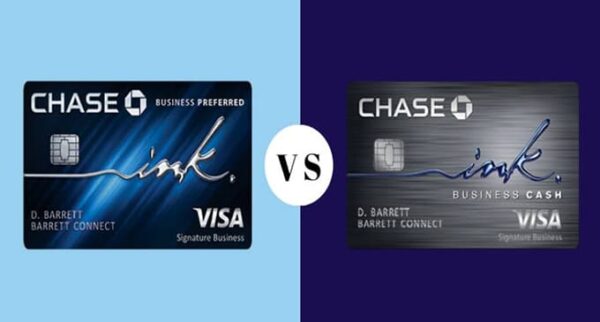Ink Business Preferred® Credit Card review
Chase introduced this card with perks specifically requested by customers, like cell phone protection and extended bonus categories. Plus, cardholders earn bonus rewards in a variety of categories.
Jump to Section
card_name
- Rewards
- points_per_dollar
- Welcome Bonus
- bonus_miles bonus_miles_disclaimer
- Annual Fee
- annual_fees
Key Features
descriptionEditor Analysis:
- This card offers plenty of bang for a modest annual fee, including cell phone insurance for the primary phone number as well as employee phones on the same account.
- Earn three points per $1 spent in select business categories ranging from the traditional – travel and shipping – to the more unique – advertising with social media and search engine sites (up to $150,000 spent annually).
- Points are worth 25% more in value when redeemed through Chase Travel℠.
- If the bonus cash-back categories don't really fit your business needs, or you spend above the $150k threshold annually, you may want to look elsewhere for maximum cash back.
CardName benefits
The CardName is recognized among our 2024 Editor’s Choice picks for the Best Small Business Credit Cards, and for good reason.
Though this card has a modest annual fee of AnnualFees, the signup bonus alone well makes up for this small expense, as does its quick points earning potential and impressive redemption offers. All elements that should make business owners – even small business owners or those who are self-employed – stand up and take notice.
New cardholders can earn 90,000 bonus points, worth a whopping $1,125 toward travel when redeemed through Chase Travel℠, once spending $8,000 in the first three months of card membership. Now, we understand that $8,000 is no small spend threshold, but if you plan it right, and open an account right before making some bigger business purchases, it’s doable and absolutely worth it in the long run. A bonus of worth $1,125 in travel is nothing to overlook. Especially for a card with such a comparably low annual fee. And that bonus is in addition to three points earned for every $1 spent on travel and other select purchases (more on those below) and one point for every $1 spent on everything else.
Points can then be exchanged for cash transfers, gift cards or, for 25% more value, can be redeemed towards airfare, hotels, car rentals and cruises through Chase Travel. Again, to put that in perspective, 90,000 Chase Travel points are worth up to $1,125 in travel, or $900 in cash. Alternatively, points can be transferred to participating travel programs at a full one-to-one value, meaning one Chase Travel point equals one partner point or mile.
CardName top features include:
- 90,000 point signup bonus (after spending $8,000 in the first three months)
- Three points for every $1 spent on travel and other select purchases
- One point per $1 on all other purchases
- No foreign transaction fees
- Trip cancellation and trip interruption insurance
- Trip delay reimbursement
- Auto rental collision damage waivers
- Cell phone insurance for the primary cardholder and employee phones on the same account
- Employee cards at no additional cost
- Purchase, price, return and extended warranty protection plans
The most eye-popping thing about this card is the generous signup bonus, but choosing a card based on the intro bonus alone usually isn’t a great idea; good thing the CardName also comes with quality cardholder perks and point-earning ease. This card is great for business owners and frequent travelers as cardholders have the opportunity to earn three points for each $1 spent on up to $150,000 spent annually on travel expenses as well as:
- Shipping costs
- Internet, cable, and phone services
- Advertising purchases made with social media sites and search engines
After the $150k cap, and on all other purchases, cardholders earn one point per $1. Better still, employee cards can be distributed at no additional cost with the option to set individual spending limits, helping you to earn rewards even faster and keep track of your business’ spending.
As far as perks go, business owners are sure to appreciate the included cell phone insurance – a truly unique feature that Chase included with its new card after hearing from customers that it was desired. The perk provides up to $600 per claim in cell phone protection against covered theft or damage for all phones listed on the monthly cell phone bill paid with the CardName.
In addition to the specific cell phone coverage, cardholders also enjoy a number of other protection services such as purchase, extended warranty, price, and return protection plans.
Similarly, travelers can also rest easy knowing that the CardName protects them with trip cancellation and trip interruption insurance, as well as trip delay reimbursements and auto rental collision damage waivers.
CardName foreign transaction fee
Not every businessperson travels overseas, but for those who do, the CardName is a card worth holding. There is no fee for foreign transactions, which is significant, as the typical foreign transaction fee is 3%.
What does that mean in terms of real savings? According to Travel Leaders Corporate, the average length of an overseas business trip is three days. Should a person spend $1,000 on food and beverages, entertainment, transportation, etc. during their trip, the savings would be $30. For someone whose job requires them to make one such trip per month, the savings would be $360 per year.
The savings generated by no foreign transaction fees magnifies the benefits that come with overseas usage. These include 3X points on all travel related expenditures, including lodging, airfare, taxi, Uber and even mass transit purchases. You also earn 3X points on all shipping costs, Internet and phone services which can come in handy through an overseas business trip.
Potential downsides of the CardName
If the bonus cash back categories don’t really fit your business needs, or if you spend more than $150,000 annually in those categories, the CardName might not be the best option if you’re looking to maximize your rewards. Those looking to make the most of their point earnings might fare better with a card with unlimited, flat-rate cash-back potential, such as CardNamediscontinued, compared below.
CardName approval odds
Do you qualify for the CardName? Since you don’t necessarily need an Employer Identification Number (EIN) to qualify for a business credit card, your chances could be higher than you might think.
The list of people who can apply for a small business credit card is long, and includes freelancers/self-employed individuals, entrepreneurs, small business owners/officers, owners/officers of established businesses, and owners/officers of startups. Most credit card companies define "business" quite broadly when it comes to considering applicants for small business credit cards. To qualify for a business credit card, you must be an "authorized officer" of a company. Basically, this means that you must have the legal right to enter into borrowing arrangements with financial institutions on behalf of a business. If you are the owner of a sole proprietorship business or the sole owner of a small business, you are already an "authorized officer." You are, after all, the only owner of the company. It can be more complicated determining who ranks for businesses that have multiple owners. In general, though, most owners are also "authorized officers."
➤ LEARN MORE:Who can apply for a business credit card?
Credit card issuers consider each application on its own merits, so don’t assume you don’t qualify just because your business might not fit that standard business model. Do keep in mind though that your personal credit history will likely be what is used to determine your eligibility and/or credit limit on a business card before you’ve built up a credit history for your business.
If your business doesn’t have a tax ID number (EIN), you can enter your personal social security number instead. In general, try to have the following information handy when you apply:
- Business name
- Business name as you want it to appear on the card
- Business address
- Type of business
- Tax ID number (or your social security number)
- Number of employees
- Annual revenue/sales
- Monthly expenses
- Number of years in business
- Ownership type (publicly traded, privately owned, etc.)
- Business structure (LLC, corporation, non-profit, etc.)
How do cardholders rate the CardName?
CardRatings commissioned Slice MR in November 2024 to survey 1,666 cardholders nationwide. Responses were given on a scale of 1-10 and respondents’ ratings were then averaged under broad topics. Here are the results for the CardName:
| Cost Effectiveness | 8.00 |
| Rewards Satisfaction | 7.85 |
| Customer Service | 7.92 |
| Website/App Usability | 7.81 |
| Likehood of Continuing to Use | 7.85 |
| Recommend to a Friend/Colleague | 7.54 |
| Overall Rating | 8.02 |
Survey results by question
Respondents rated their personal experience with the card_name, answering questions on a scale from 1-10. The results for each question can be found below:
How does the CardName compare to other business credit cards?
CardName vs. CardName
discontinued
The CardName and CardName both have great new cardholder bonuses. With the CardName, new cardholders can earn $350 once spending $3,000 on purchases in the first three months and an additional $400 once spending $6,000 on purchases in the first six months after account opening. CardName has a higher bonus value, albeit with a higher spend requirement; 90,000 points offered for $8,000 in purchases in the first three months from account opening. This bonus alone can be worth up to $1,125 toward travel when redeemed through Chase Travel.
The CardName has no annual fee and an introductory offer of 0% APR for intro_apr_duration on purchases, then RegAPR. This does give a slight edge over the AnnualFees annual fee for CardName. The CardName, however, does come with additional travel perks including no foreign transaction fees and a 1:1 point transfer value to leading airline and hotel loyalty programs.
The ongoing rewards rates on these two cards is a bit different as well. The CardName is more so focused on earning cardholders high rewards on travel (three points per dollar on the first $150,000 spent) in addtion to select business expenses, whereas the CardName focuses predominantly on business purchases, and on restaurant and gas purchases as well. CardName earns 5% cash back on the first $25,000 spent in combined purchases at office supply stores and on internet, cable and phone services each account anniversary year; 2% cash back on the first $25,000 spent in combined purchases at gas stations and restaurants; and 1% cash back on all other card purchases.
For an in-depth breakdown of how these two cards line up side-by-side, see our full Ink Business Preferred® vs. Cash® comparison.
CardName vs. CardName
discontinued
Similar to the CardName, CardName allows for employee cards at no additional cost, but unlike the Chase card, there is no limit on how much users can spend before premium earnings stop.
Instead, the Capital One card offers unlimited 2% cash back on all purchases with no caps or categories to limit purchasing, and unlimited 5% cash back on hotels and rental cars booked through Capital One Travel. Additionally, those looking for a nice welcome offer might appreciate the opportunity to earn a one-time cash bonus of $2,000 once you spend $30,000 in the first three months, plus earn an additional $2,000 cash bonus for every $500,000 spent during the first year. Also, cardholders have access to similar perks such as fraud coverage and extended warranty plans as well as travel and emergency assistance services. Both cards charge an annual fee, though Capital One’s fee is slightly higher at AnnualFees. It should be noted, however, that this fee is refunded once spending at least $150,000 in a year with the card.
Is the CardName a good card?
Even though this card has a modest annual fee, the large signup bonus more than helps make up for that expense during the first year, and the high ongoing rewards help to offset it moving forward. Since bonus rewards are focused on travel and business expenses, this is an ideal card for any business owner who frequently travels, and is even better for those often traveling abroad thanks to no foreign transaction fees.
Frequently asked questions
What credit score do you need for card_name?
How much is the card_name fee?
Our Methodology
Survey methodology: CardRatings commissioned Slice MR in November 2024 to survey 1,666 cardholders nationwide. CardRatings’ website analytics from Jan. 1, 2024-Oct. 31, 2024 were used to determine a selection of the most popular cards. Responses to 10 questions were given on a scale of 1-10. For nine of these questions, respondents’ scores were averaged under broad topics. The overall rating represents an average of respondents’ responses to their overall rating of each card.
Disclaimer:The information in this article is believed to be accurate as of the date it was written. Please keep in mind that credit card offers change frequently. Therefore, we cannot guarantee the accuracy of the information in this article. Reasonable efforts are made to maintain accurate information. See the online credit card application for full terms and conditions on offers and rewards. Please verify all terms and conditions of any credit card prior to applying.
This content is not provided by any company mentioned in this article. Any opinions, analyses, reviews or recommendations expressed here are those of the author’s alone, and have not been reviewed, approved or otherwise endorsed by any such company. CardRatings.com does not review every company or every offer available on the market.










